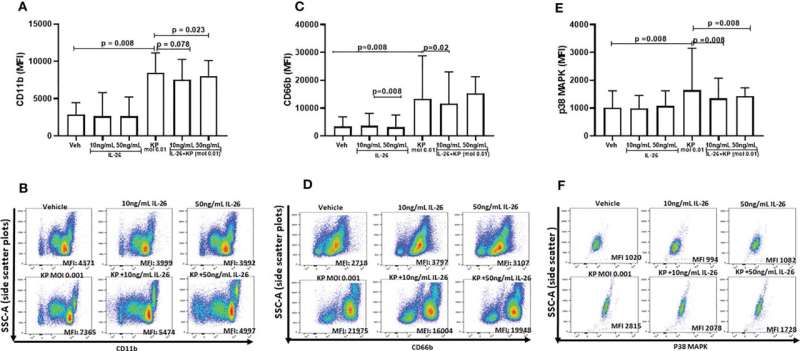Effects of IL-26 on the activation state of neutrophils exposed to Klebsiella pneumoniae. Human blood neutrophils were exposed to live Klebsiella pneumoniae (multiplicity infection (MOI); 0.01) with and without additional stimulation by rhIL-26 (10 and 50 ng/mL) for 3 hours. The expression of CD11b, CD66b and p38 MAPK was assessed using flow cytometry and their median florescent intensity (MFI) determined. Data sets are shown in panels as follows: (A) MFI for CD11b expression for all subjects (n=8); (B) Representative scatter plots for CD11b expression; (C) MFI for CD66b for all subjects (n=8); (D) Representative scatter plots for CD66b expression; (E) MFI for p38 MAPK expression for all subjects (n=9); (F) Representative scatter plots for p38 MAPK expression. The results in panels (A, C, E) are presented as median with range and the p-values are according to Wilcoxon Signed-rank test. p-values <0.05 are considered to indicate statistical significance. Credit: DOI: 10.3389/fimmu.2021.761317
Researchers at Karolinska Institutet in Sweden report that a recently discovered inflammatory mediator, interleukin-26, appears to have an important role in pneumonia and contributes to the killing of bacteria. The study is published in the scientific journal Frontiers in Immunology.
Bacterial lung infection affects both children and adults worldwide, and pneumonia remains a common cause of premature death in many parts of the world, with millions of people dying from it every year. To facilitate the development of more effective therapies, researchers at Karolinska Institutet are trying to characterize the immunological mechanisms involved in pneumonia.
The new study demonstrates that an inflammatory mediator called interleukin-26 (IL-26) is critically involved in bacterial pneumonia in humans. During the last decade, IL-26 has emerged as an important player in the so-called innate immune response, our first line of defense against pathogens. It is abundant in the airways of healthy humans, and bacterial exposure stimulates an increased release of IL-26 by lung cells and white blood cells.
Studying human lung tissue and airway samples from patients with bacterial pneumonia, the researchers were able to show that IL-26 exerts complex modulatory effects on the immune system and that the protein directly kills bacteria known to cause pneumonia.
"Antibiotics are not sufficient to treat pneumonia and antibiotic resistance is an increasing problem, highlighting the need for biological treatments of this global killer disease. Our findings position IL-26 as a new potential target for biological treatment and emphasize that its role in pneumonia deserves to be further evaluated," says lead author Karlhans Che, a researcher at the Institute of Environmental Medicine, Karolinska Institutet.
More information: Karlhans F. Che et al, Complex Involvement of Interleukin-26 in Bacterial Lung Infection, Frontiers in Immunology (2021). DOI: 10.3389/fimmu.2021.761317
Journal information: Frontiers in Immunology
Provided by Karolinska Institutet
























